
Andar to walk
Present Indicative: ando, andas, etc. I walk, etc.
Imperfect: andaba, etc. I was walking, etc.
Preterit: anduve, anduviste, anduvo, anduvimos, anduvisteis, anduvieron I walked, etc.
Future: andaré, etc. I will walk, etc.
Conditional: andaría, etc. I would walk, etc.
Present Participle: andando walking
Past Participle: andado walked
Present Subjunctive: ande, etc. that I walk/will walk, etc.
Imperfect Subjunctive: anduviera (anduviese) anduvieras, anduviera, anduviéramos, anduvierais, anduvieran that I walked/would walk, etc.; if I walked, etc.
Present Perfect Subjunctive: haya andado, etc. that I walked/have walked, etc.
Pluperfect Subjunctive: hubiera (hubiese) andado, etc. that I had walked/would have walked, etc.; if I had walked, etc.
Asir to seize
Present Indicative: asgo, ases, etc. I seize, etc.
Imperfect: asía, etc. I was seizing, etc.
Preterit: así, asiste, etc. I seized, etc.
Future: asiré, etc. I will seize, etc.
Conditonal: asiría, etc. I would seize, etc.
Present Participle: asiendo seizing
Past Participle: asido seized
Present Subjunctive: asga, asgas, asga, asgamos, asgáis, asgan that I seize/will sieze, etc.
Imperfect Subjunctive: asiera (asiese), etc. that I siezed/would sieze, etc.; if I seized, etc.
Present Perfect Subjunctive: haya asido, etc. that I siezed/have siezed, etc.
Pluperfect Subjunctive: hubiera (hubiese) asido, etc. that I had siezed/would have siezed, etc.; if I had seized, etc.

Caber to be room for, to fit
Present Indicative: quepo, cabes, etc. I fit, etc.
Imperfect: cabía, etc. I was fitting, etc.
Preterit: cupe, cupiste, cupo, cupimos, cupisteis, cupieron I fitted, etc.
Future: cabré, cabrás, cabrá, cabremos, cabréis, cabrán I will fit, etc.
Conditional: cabría, etc. I would fit, etc.
Present Participle: cabiendo fitting
Past Participle: cabido fitted
Present Subjunctive: quepa, quepas, quepa, quepamos, quepáis, quepan that I fit/will fit, etc.
Imperfect Subjunctive: cupiera (cupiese), etc. that I fit/would fit, etc.; if I fit, etc.
Present Perfect Subjunctive: haya cabido, etc. that I fit/have fit, etc.
Pluperfect Subjunctive: hubiera (hubiese) cabido, etc. that I had fit/would have fit, etc.; if I had fit, etc.
Caer to fall
Present Indicative: caigo, caes, cae, caemos, caéis, caen I fall, etc.
Imperfect: caía, etc. I was falling, etc.
Preterit: caí, caíste, cayó, caímos, caísteis, cayeron I fell, etc.
Future: caeré, etc. I will fall, etc.
Conditional: caería, etc. I would fall, etc.
Present Participle: cayendo falling
Past Participle: caído fallen
Present Subjunctive: caiga, caigas, caiga, caigamos, caigáis, caigan that I fall/will fall, etc.
Imperfect Subjunctive: cayera, (cayese), etc. that I fell/would fall, etc., if I fell, etc.
Present Perfect Subjunctive: haya caído, etc. that I fell/have fallen, etc.
Pluperfect Subjunctive: hubiera (hubiese) caído, etc. that I had fallen/would have fallen, etc.; if I had fallen, etc.

Write the verbs in the tense and person indicated:
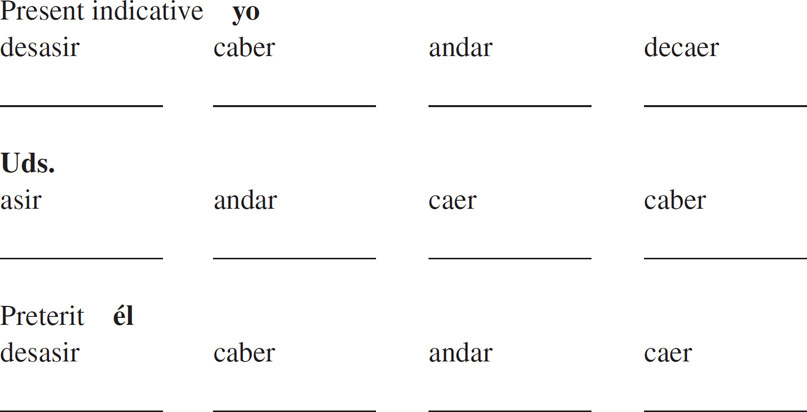
Translate into English:
1. ellos caerían _________________________
2. cabremos _________________________
3. que hayas caído _________________________
4. andabais _________________________
5. Uds. cabrían _________________________
6. ellos cayeron _________________________
7. decaeríais _________________________
8. cupiste _________________________
9. desasimos _________________________
10. anduvimos _________________________
11. que decaigamos _________________________
12. que ellos quepan _________________________
13. que Uds. caigan _________________________
14. asiré _________________________
15. decaímos _________________________
16. él caerá _________________________
17. que yo cupiera _________________________
18. caigo _________________________
19. quepo _________________________
20. que ellos asgan _________________________
21. que decayeras _________________________
22. andaremos _________________________
23. que ellos hubieran asido _________________________
24. ellos habrían andado _________________________
25. Uds. desasirán _________________________
26. ellos están decayendo _________________________
27. que andemos _________________________
28. él habrá decaído _________________________
29. que ellos anduviesen _________________________
30. Uds. asen _________________________
1. that they would not fall _________________________
2. that I had walked _________________________
3. they would seize _________________________
4. were you (s., fam.) walking? _________________________
5. they are fading _________________________
6. if they loosened _________________________
7. that you (pl., fam.) would decline _________________________
8. will I walk? _________________________
9. I loosen _________________________
10. he walked _________________________
11. did he fit? _________________________
12. we were loosening _________________________
13. they declined _________________________
14. we should have fitted _________________________
15. I will not fall _________________________
16. he fits _________________________
17. I hope we walk _________________________
18. he had seized _________________________
19. he would not have fallen _________________________
20. he may walk _________________________
21. you (s., fam.) had seized _________________________
22. I walk _________________________
23. you (pl., for.) would fall _________________________
24. did he seize? _________________________
25. he has fallen _________________________
26. I hope we fit _________________________
27. you (s., fam.) used to walk _________________________
28. we were falling _________________________
29. that you (s., fam.) have walked _________________________
30. we had fitted _________________________
31. that I have seized _________________________
32. you (pl., fam.) fell _________________________
33. if I had fallen _________________________
34. you (s., for.) fitted _________________________
35. if I fit _________________________
36. you (s., fam.) decline _________________________
37. that they seize _________________________
38. if we fell _________________________
39. it’s possible that I won’t fit _________________________
40. that you (pl., for.) will fall _________________________
Conducir to drive, lead, conduct
Present Indicative: conduzco, conduces, etc. I drive, etc.
Imperfect: conducía, etc. I was driving, etc.
Preterit: conduje, condujiste, condujo, condujimos, condujisteis, condujeron I drove, etc.
Future: conduciré, etc. I will drive, etc.
Conditional: conduciría, etc. I would drive, etc.
Present Participle: conduciendo driving
Past Participle: conducido drove
Present Subjunctive: conduzca, conduzcas, conduzca, conduzcamos, conduzcáis, conduzcan that I drive/will drive, etc.
Imperfect Subjunctive: condujera (condujese), etc. that I drove/would drive, etc.; if I drove, etc.
Present Perfect Subjunctive: haya conducido, etc. that I drove/have driven, etc.
Pluperféct Subjunctive: hubiera (hubiese) conducido, etc. that I had driven/would have driven, etc.; if I had driven, etc.
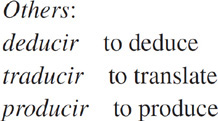
Dar to give
Present Indicative: doy, das, da, damos, dais, dan I give, etc.
Imperfect: daba, etc. I was giving, etc.
Preterit: di, diste, dio, dimos, disteis, dieron I gave, etc.
Future: daré, etc. I will give, etc.
Conditional: daría, etc. I would give, etc.
Present Participle: dando giving
Past Participle: dado given
Present Sujunctive: dé, des, dé, demos, deis, den that I give/will give, etc.
Imperfect Subjunctive: diera, (diese), etc. that I gave/would give, etc.; if I gave, etc.
Present Perfect Subjunctive: haya dado, etc. that I gave/have given, etc.
Pluperfect Subjunctive: hubiera (hubiese) dado, etc. that I had given/would have given, etc.; if I had given, etc.
Decir to say, tell
Present Indicative: digo, dices, dice, decimos, decís, dicen to say, etc.
Imperfect: decía, etc. I was saying, etc.
Preterit: dije, dijiste, dijo, dijimos, dijisteis, dijeron I said, etc.
Future: diré, dirás, dirá, diremos, diréis, dirán I will tell, etc.
Conditional: diría, etc. I would tell, etc.
Present Participle: diciendo saying
Past Participle: dicho said
Present Subjunctive: diga, digas, diga, digamos, digáis, digan that I say/will say, etc.
Imperfect Subjunctive: dijera (dijese), etc. that I said/would say, etc.; if I said, etc.
Present Perfect Subjunctive: haya dicho, etc. that I said/have said, etc.
Pluperfect Subjunctive: hubiera (hubiese) dicho, etc. that I had said/would have said, etc.; if I had said, etc.

* Note that maldecir and bendecir are regular in the future and the conditional (maldeciré, bendeciría, etc.). The past participles of these verbs are also regular (maldecido, bendecido).
Errar to err, to wander
Pesent Indicative: yerro, yerras, yerra, erramos, erráis, yerran I wander, etc.
Imperfect: erraba, etc. I was wandering, etc.
Preterit: erré, etc. I wandered, etc.
Future: erraré, etc. I will wander, etc.
Conditional: erraría, etc. I would wander, etc.
Present participle: errando wandering
Past Participle: errado wandered
Present Subjunctive: yerre, yerres, yerre, erremos, erréis, yerren that I err/will err, etc.
Imperfect Subjunctive: errara (errase), etc. that I erred/would err, etc.; if I erred, etc.
Present Perfect Subjunctive: haya errado, etc. that I erred/have erred, etc.
Pluperfect Subjunctive: hubiera (hubiese) errado, etc. that I had erred/would have erred, etc.; if I had erred, etc.
Write the verbs in the person and tense indicated:
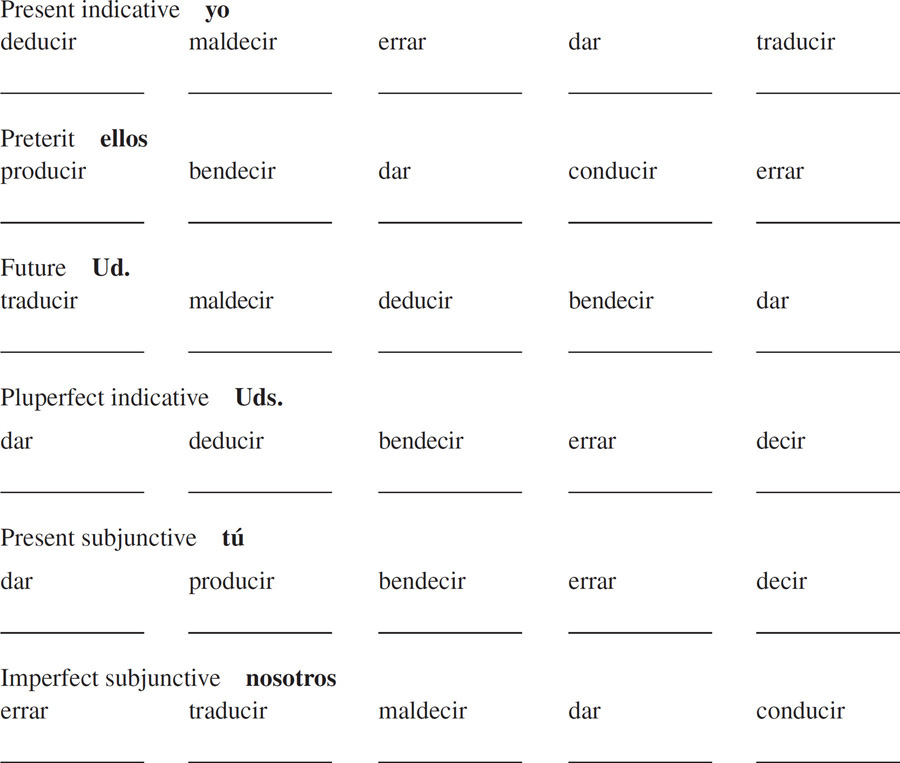
Write in English:
1. dedujisteis _________________________
2. das _________________________
3. él dirá _________________________
4. que erremos _________________________
5. conducíamos _________________________
6. que ellos den _________________________
7. que digamos _________________________
8. maldecías _________________________
9. él traduce _________________________
10. Ud. habría dado _________________________
11. ellos dijeron _________________________
12. que yo haya dicho _________________________
13. ella condujo _________________________
14. doy _________________________
15. yerres _________________________
16. diríamos _________________________
17. que yo deduzca _________________________
18. Ud. dio _________________________
19. ellos bendicen _________________________
20. Uds. yerran _________________________
21. él produciría _________________________
22. que dieras _________________________
23. que él dijera _________________________
24. yerro _________________________
25. que ella tradujera _________________________
26. dábamos _________________________
27. ellos habrían maldicho _________________________
28. erré _________________________
29. produzco _________________________
30. daré _________________________
Write in Spanish:
1. you (s., fam.) will say _________________________
2. you (pl., fam.) lead _________________________
3. let us wander _________________________
4. it’s possible that she told _________________________
5. he was not giving _________________________
6. you (s., fam.) translated _________________________
7. if he blessed _________________________
8. we will give _________________________
9. it’s impossible for you (pl., for.) to produce
10. did he lead? _________________________
11. if you (s., fam.) had said _________________________
12. does he give? _________________________
13. I do wander _________________________
14. it’s possible that he will deduce _________________________
15. we would curse _________________________
16. they gave _________________________
17. if I produced _________________________
18. do not translate! (pl., for.) _________________________
19. are they saying? _________________________
20. they wandered _________________________
21. it’s possible that they have given _________________________
22. have you (pl., fam.) not told? _________________________
23. I produce _________________________
24. he wanders _________________________
25. we will not tell _________________________
26. they were not saying _________________________
27. I do not give _________________________
28. it’s possible that I will deduce _________________________
29. if they didn’t translate _________________________
30. you (s., fam.) cursed _________________________
31. did you (pl., fam.) give? _________________________
32. we will lead _________________________
33. I hope you (s., for.) give _________________________
34. I bless _________________________
35. they produced _________________________
36. you (s., fam.) were translating _________________________
37. it’s possible that he didn’t give _________________________
38. it’s possible that he will curse _________________________
39. if they hadn’t given _________________________
40. it’s possible that he won’t drive _________________________
Estar to be (in a state or condition)
Present Indicative: estoy, estás, está, estamos, estáis, están I am, etc.
Imperfect: estaba, etc. I was, etc.
Preterit: estuve, estuviste, estuvo, estuvimos, estuvisteis, estuvieron I was, etc.
Future: estaré, etc. I will be, etc.
Conditional: estaría, etc. I would be, etc.
Present Participle: estando being
Past Participle: estado been
Present Subjunctive: esté, estés, esté, estemos, estéis, estén that I will be etc.
Imperfect Subjunctive: estuviera (estuviese), etc. that I was/would be, etc.; if I were, etc.
Present Perfect Subjunctive: haya estado, etc. that I was/have been, etc.
Pluperfect Subjunctive: hubiera (hubiese) estado, etc. that I had been/would have been, etc.; if I had been
Haber to have (used only as an auxiliary with perfect tenses or in idiomatic expressions. Some tenses are defective, i.e., they do not have complete forms)
Present Indicative: he, has, ha, hemos, habéis, han I have, etc.; hay there is, are
Imperfect: había, etc. I had, etc.; había there was, were
Preterit: hube, hubiste, hubo, hubimos, hubisteis, hubieron I had, etc.; hubo there was, were
Future: habré, habrás, habrá, habremos, habréis, habrán. I will have, etc.; habrá there will be
Conditional: habría, etc. I would have, etc.; habría there would be
Present Participle: habiendo having, there being
Past Participle: habido ha (había, habrá, habría) habido there has (had, will have, would have) been
Present Subjunctive: haya, hayas, haya, hayamos, hayáis, hayan I may have, etc. haya that I will have ___, etc./there are/will be’
Imperfect Subjunctive: hubiera (hubiese), etc. I might have, etc.; hubiera (hubiese) that I had ___/would have ___, etc., there were’; if I had ____, etc.
Present Perfect Subjunctive: haya habido that there were/have been’
Pluperfect Subjunctive: hubiera (hubiese) habido that there had been; if there had been
Hacer to do, make
Present Indicative: hago, haces, hace, hacemos, hacéis, hacen I do, etc.
Imperfect: hacía, etc. I was doing, etc.
Preterit: hice, hiciste, hizo, hicimos, hicisteis, hicieron I did, etc.
Future: haré, harás, hará, haremos, haréis, harán I will do, etc.
Conditional: haría, etc. I would do, etc.
Present Participle: haciendo doing
Past Participle: hecho done
Present Subjunctive: haga, hagas, haga, hagamos, hagáis, hagan that I do/will do, etc.
Imperfect Subjunctive: hiciera (hiciese), etc. that I did/would do, etc.; if I did, etc.
Present Perfect Subjunctive: haya hecho, etc. that I did/have done, etc.
Pluperfect Subjunctive: hubiera (hubiese) hecho, etc. that I had done/would have done, etc.; if I had done, etc.

Ir to go
Present Indicative: voy, vas, va, vamos, vais, van I go, etc.
Imperfect: iba, ibas, iba, íbamos, ibais, iban I was going, etc.
Preterit: fui, fuiste, fue, fuimos, fuisteis, fueron I went, etc.
Future: iré, etc. I will go, etc.
Conditional: iría, etc. I would go, etc.
Present Participle: yendo going
Past Participle: ido gone
Present Subjunctive: vaya, vayas, vaya, vayamos, vayáis, vayan that I go/will go, etc.
Imperfect Subjunctive: fuera (fuese), etc. that I went/would go, etc.; if I went, etc.
Present Perfect Subjunctive: haya ido, etc. that I went/have gone, etc.
Pluperfect Subjunctive: hubiera (hubiese) ido, etc. that I had gone/would have gone, etc.; if I had gone, etc.
Change to the plural of the same tense:
1. voy _________________________
2. Ud. satisfaga _________________________
3. habrá _________________________
4. estoy _________________________
5. ibas _________________________
6. yo hubiera _________________________
7. he _________________________
8. estuvo _________________________
9. fui _________________________
10. hará _________________________
11. hubiste _________________________
12. hicieras _________________________
13. él vaya _________________________
14. estuvieras _________________________
15. has hecho _________________________
16. Ud. haya _________________________
17. fueras _________________________
18. satisfizo _________________________
19. Ud. esté _________________________
20. satisfago _________________________
Translate into English:
1. él habrá satisfecho _________________________
2. estamos _________________________
3. hay _________________________
4. fuiste _________________________
5. él haría _________________________
6. satisficiste _________________________
7. habría habido _________________________
8. que hayas hecho _________________________
9. yo no estaría _________________________
10. satisfaré _________________________
11. ellos habían _________________________
12. hacíamos _________________________
13. ibais _________________________
14. que satisficiésemos _________________________
15. que haya habido _________________________
16. yo habría estado _________________________
17. que Ud. satisfaga _________________________
18. que estuvieras _________________________
19. habrías _________________________
20. hicimos _________________________
21. ellos estaban _________________________
22. que él hiciera _________________________
23. él ha _________________________
24. que no vayas _________________________
25. yo habría hecho _________________________
26. satisfacías _________________________
27. que fuéramos _________________________
28. que estén _________________________
29. estuve _________________________
30. va _________________________
Write in Spanish:
1. that we had gone _________________________
2. I was (pret) _________________________
3. that I have done _________________________
4. they would have satisfied _________________________
5. he was (imperfect) _________________________
6. they will not have gone _________________________
7. we were not doing _________________________
8. you (pl., for.) will satisfy _________________________
9. we are _________________________
10. I had done _________________________
11. he was going _________________________
12. I satisfied _________________________
13. I hope we are _________________________
14. there are not _________________________
15. we do not satisfy _________________________
16. does she go? _________________________
17. you (s., for.) will be _________________________
18. they did _________________________
19. I hope we satisfy _________________________
20. it’s possible that I wasn’t _________________________
21. there would have been _________________________
22. if you (s., fam.) went _________________________
23. he was satisfying _________________________
24. there will be _________________________
25. it’s possible that I will go _________________________
26. if there were _________________________
27. it’s impossible that he will satisfy _________________________
28. you (s., fam.) will do _________________________
29. if there were _________________________
30. if they had been _________________________
31. you (pl., fam.) went _________________________
32. there has been _________________________
33. I hope they don’t do _________________________
34. I satisfy _________________________
35. if they hadn’t done _________________________
36. I will not go _________________________
37. I hope there will be _________________________
38. we would do _________________________
39. there was (imperfect) _________________________
40. I am not _________________________
Oír to hear
Present Indicative: oigo, oyes, oye, oímos, oís, oyen I hear, etc.
Imperfect: oía, oías, etc. I was hearing, etc.
Preterit: oí, oíste, oyó, oímos, oísteis, oyeron I heard, etc.
Future: oiré, etc. I will hear, etc.
Conditional: oiría, etc. I would hear, etc.
Present Participle: oyendo hearing
Past Participle: oído heard
Present Subjunctive: oiga, oigas, oiga, oigamos, oigáis, oigan that I hear/will hear, etc.
Imperfect Subjunctive: oyera (oyese), etc. that I heard/would hear etc.; if I heard, etc.
Present Perfect Subjunctive: haya oído, etc. that I heard/have heard, etc.
Pluperfect Subjunctive: hubiera (hubiese) oído, etc. that I had heard/would have heard, etc.; if I had heard, etc.
Oler to smell
Present Indicative: huelo, hueles, huele, olemos, oléis, huelen I smell, etc.
Imperfect: olía, etc. I was smelling, etc.
Preterit: olí, oliste, etc. I smelled, etc.
Future: oleré, etc. I will smell, etc.
Conditional: olería, etc. I would smell, etc.
Present Participle: oliendo smelling
Past Participle: olido smelled
Present Subjunctive: huela, huelas, huela, olamos, oláis, huelan that I smell/will smell, etc.
Imperfect Subjunctive: oliera (oliese), etc. that I smelled/would smell, etc.; if I smelled, etc.
Present Perfect Subjunctive: haya olido, etc. that I smelled/have smelled, etc.
Pluperfect Subjunctive: hubiera (hubiese) olido, etc. that I had smelled/would have smelled, etc.; if I had smelled, etc.
Poder to be able
Present Indicative: puedo, puedes, puede, podemos, podéis, pueden I can, am able, etc.
Imperfect: podía, etc. I was able, could, etc.
Preterit: pude, pudiste, pudo, pudimos, pudisteis, pudieron I was able, could, etc.
Future: podré, podrás, podra, podremos, podréis, podrán I will be able, etc.
Conditional: podría, etc. I would be able, could, etc.
Present Participle: pudiendo being able
Past Participle: podido been able
Present Subjunctive: pueda, puedas, pueda, podamos, podáis, puedan that I can/will be able, etc.
Imperfect Subjunctive: pudiera (pudiese), etc. that I could/would be able, etc.; if I were able, etc.
Present Perfect Subjunctive: haya podido, etc. that I could/have been able, etc.
Pluperfect Subjunctive: hubiera (hubiese) podido, etc. that I had been able/would have been able, etc.; if I had been able, etc.
Poner to put, place
Present Indicative: pongo, pones, pone, ponemos, ponéis, ponen I put, etc.
Imperfect: ponía, etc. I was putting, etc.
Preterit: puse, pusiste, puso, pusimos, pusisteis, pusieron I put, did put, etc.
Future: pondré, pondrás, pondrá, pondremos, pondréis, pondrán I will put, etc.
Conditional: pondría, etc. I would put, etc.
Present Participle: poniendo putting
Past Participle: puesto put
Present Subjunctive: ponga, pongas, ponga, pongamos, pongáis, pongan that I put/will put, etc.
Imperfect Subjunctive: pusiera (pusiese), etc. that I put/would put, etc.; if I put, etc.
Present Perfect Subjunctive: haya puesto, etc. that I put/have put, etc.
Pluperfect Subjunctive: hubiera (hubiese) puesto, etc. that I had put/would have put, etc.; if I had put, etc.

Change the verbs to the tense and person indicated:
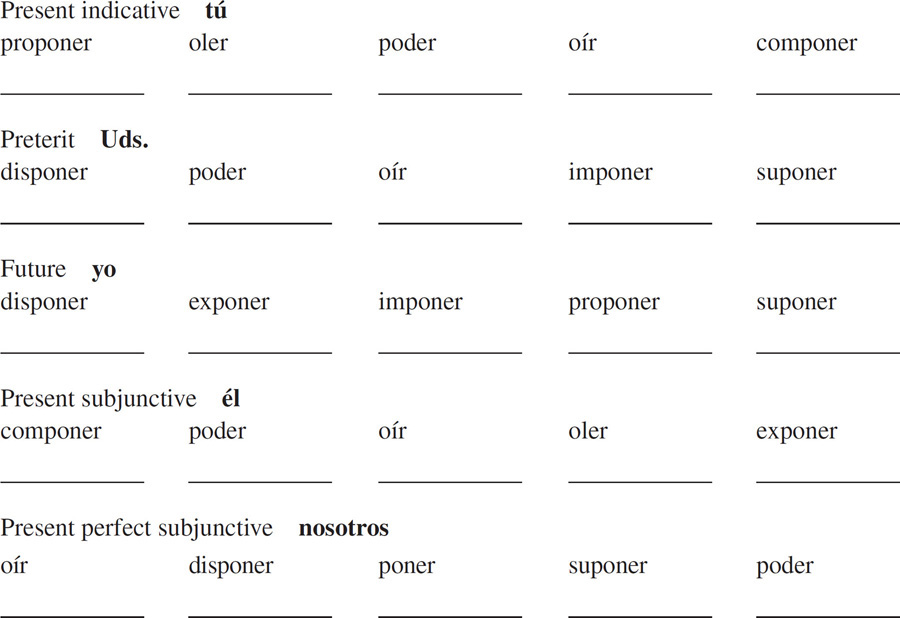
Change the singular verb to plural, retaining the same tense:
1. él pusiera _________________________
2. yo pueda _________________________
3. él oiría _________________________
4. pudiste _________________________
5. dispones _________________________
6. yo oía _________________________
7. Ud. podrá _________________________
8. olió _________________________
9. he compuesto _________________________
10. habré podido _________________________
11. oiré _________________________
12. olerías _________________________
13. él impondría _________________________
14. él podía _________________________
15. habrá oído _________________________
16. huele _________________________
17. yo exponga _________________________
18. oyó _________________________
19. yo pudiera _________________________
20. yo haya propuesto _________________________
21. podrías _________________________
22. oigas _________________________
23. huelo _________________________
24. supondrás _________________________
25. puedes _________________________
26. Ud. oye _________________________
27. huelas _________________________
28. dispuso _________________________
29. yo oliera _________________________
30. hubieras puesto _________________________
Write in Spanish:
1. you (s., fam.) heard _________________________
2. we had not been able _________________________
3. it’s possible that it will smell _________________________
4. I would not have put _________________________
5. you (pl., fam.) were not hearing _________________________
6. they are imposing _________________________
7. I was able _________________________
8. does he smell? _________________________
9. they would hear _________________________
10. he may be able _________________________
11. I will have composed _________________________
12. does she put? _________________________
13. does he hear? _________________________
14. you (s., fam.) will not expose _________________________
15. I hope they propose _________________________
16. I might not be able _________________________
17. it was possible that we heard _________________________
18. you (pl., for.) would be able _________________________
19. it was impossible that they smelled _________________________
20. it’s possible that we suppose _________________________
21. you (pl., fam.) will not hear _________________________
22. are you (s., fam.) able? _________________________
23. if we disposed _________________________
24. they will not put _________________________
25. they heard _________________________
26. you (pl., fam.) were able (pret) _________________________
27. she was supposing _________________________
28. you (s., fam.) will be able _________________________
29. if we didn’t hear _________________________
30. did you (pl., fam.) expose? _________________________
Querer to want, wish, love
Present Indicative: quiero, quieres, quiere, queremos, queréis, quieren I want, etc.
Imperfect: quería, etc. I was wishing, etc.
Preterit: quise, quisiste, quiso, quisimos, quisisteis, quisieron I wanted, etc.
Future: querré, querrás, querrá, querremos, querréis, querrán I shall want, etc.
Conditional: querría, etc. I would wish, etc.
Present Participle: queriendo wanting
Past Participle: querido wanted
Present Subjunctive: quiera, quieras, quiera, queramos, queráis, quieran that I want/will want, etc.
Imperfect Subjunctive: quisiera (quisiese), etc. that I wanted/would want, etc.; if I wanted, etc.
Present Perfect Subjunctive: haya querido, etc. that I wanted/have wanted, etc.
Pluperfect Subjunctive: hubiera (hubiese) querido, etc. that I had wanted/would have wanted, etc.; if I had wanted, etc.
Saber to know (a fact)
Present Indicative: sé, sabes, sabe, sabemos, sabéis, saben I know, etc.
Imperfect: sabía, etc. I was knowing, etc.
Preterit: supe, supiste, supo, supimos, supisteis, supieron I knew, found out, etc.
Future: sabré, sabrás, sabrá, sabremos, sabréis, sabrán I will know, etc.
Conditional: sabría, etc. I would know, etc.
Present Participle: sabiendo knowing
Past Participle: sabido known
Present Subjunctive: sepa, sepas, sepa, sepamos, sepáis, sepan that I know/will know, etc.
Imperfect Subjunctive: supiera (supiese), etc. that I knew/would know, etc.; if I knew, etc.
Present Perfect Subjunctive: haya sabido, etc. that I knew/have known, etc.
Pluperfect Subjunctive: hubiera (hubiese) sabido, etc. that I had known/would have known, etc.; if I had known
Present Indicative: salgo, sales, sale, salimos, salís, salen I go out, etc.
Imperfect: salía, etc. I was going out, etc.
Preterit: salí, etc. I went out, etc.
Future: saldré, saldrás, saldrá, saldremos, saldréis, saldrán I will go out, etc.
Conditional: saldría, etc. I would go out, etc.
Present Participle: saliendo going out
Past Participle: salido gone out
Present Subjunctive: salga, salgas, salga, salgamos, salgáis, salgan that I go out/will go out, etc.
Imperfect Subjunctive: saliera (saliese), etc. that I went out/would go out, etc.; if I went out, etc.
Present Perfect Subjunctive: haya salido, etc. that I went out/have gone out, etc.
Pluperfect Subjunctive: hubiera (hubiese) salido, etc. that I had gone out/would have gone out, etc.; if I had gone out
Ser to be
Present Indicative: soy, eres, es, somos, sois, son I am, etc.
Imperfect: era, eras, era, éramos, erais, eran I was, etc.
Preterit: fui, fuiste, fue, fuimos, fuisteis, fueron I was, etc.
Future: seré, etc. I will be, etc.
Conditional: sería, etc. I would be, etc.
Present Participle: siendo being
Past Participle: sido been
Present Subjunctive: sea, seas, sea, seamos, seáis, sean that I am/will be, etc.
Imperfect Subjunctive: fuera (fuese), etc. that I was/would be, etc.; if I were, etc.
Present Perfect Subjunctive: haya sido, etc. that I was/have been, etc.
Pluperfect Subjuctive: hubiera (hubiese) sido, etc. that I had been/would have been, etc.; if I had been, etc.
Note: The preterits of ser and ir are identical. The context makes clear which one is intended.
A. Change each verb to express past time in the same person.
1. somos _________________________
2. sepas _________________________
3. salimos _________________________
4. sabe _________________________
5. eres _________________________
6. salga _________________________
7. él sea _________________________
8. soy _________________________
9. queremos _________________________
10. salgo _________________________
11. he sabido _________________________
12. habéis salido _________________________
13. quiere _________________________
14. estás saliendo _________________________
15. quieran _________________________
B. Change each singular verb to plural in the same tense.
1. yo salía _________________________
2. Ud. sabrá _________________________
3. tú querrás _________________________
4. salió _________________________
5. sepas _________________________
6. saldrías _________________________
7. sabe _________________________
8. eres _________________________
9. yo había querido _________________________
10. salga _________________________
11. será _________________________
12. él quisiera _________________________
13. saldré _________________________
14. yo sea _________________________
15. Ud. fuera _________________________
C. Translate into English:
1. seríamos _________________________
2. fuimos _________________________
3. quisiste _________________________
4. habré sido _________________________
5. que fueses _________________________
6. he sabido _________________________
7. habremos sabido _________________________
8. que queramos _________________________
9. sabréis _________________________
10. erais _________________________
11. él supo _________________________
12. él había salido _________________________
13. ellos querían _________________________
14. sabríais _________________________
15. que hayan salido _________________________
16. si hubiéramos sabido _________________________
17. que yo sea _________________________
18. si él quisiera _________________________
19. salieran _________________________
20. si supiéramos _________________________
Write in Spanish:
1. if he knew _________________________
2. you (pl., fam.) have gone out _________________________
3. he would want _________________________
4. I was not (pret) _________________________
5. you (pl., fam.) have known _________________________
6. we are _________________________
7. I hope he goes out _________________________
8. you (s., fam.) will want _________________________
9. we were knowing _________________________
10. he was (imperf.) _________________________
11. we were wanting _________________________
12. it’s possible that we won’t go out _________________________
13. you (pl., fam.) will know _________________________
14. I hope they are _________________________
15. it’s possible that I have wanted _________________________
16. you (s., for.) will not be _________________________
17. they will have known _________________________
18. they went out _________________________
19. you (s., fam.) had wanted _________________________
20. we are not going out _________________________
21. it’s possible that he knew _________________________
22. is he? _________________________
23. you (s., fam.) used to go out _________________________
24. I did not want _________________________
25. they would have known _________________________
26. don’t they want? _________________________
27. we have been _________________________
28. he will go out _________________________
29. we should know _________________________
30. if you (pl., for.) wanted _________________________
31. I am going out _________________________
32. you (s., for.) knew _________________________
33. I have wanted _________________________
34. it’s possible that we were _________________________
35. it’s possible that you (s., fam.) (will) want _________________________
36. would they go out? _________________________
37. I know _________________________
38. if he were _________________________
39. they were (pret.) _________________________
40. we will have been _________________________
Tener to have, hold, possess
Present Indicative: tengo, tienes, tiene, tenemos, tenéis, tienen I have, etc.
Imperfect: tenía, etc. I was having, etc.
Preterit: tuve, tuviste, tuvo, tuvimos, tuvisteis, tuvieron I had, etc.
Future: tendré, tendrás, tendrá, tendremos, tendréis, tendrán I will have, etc.
Conditional: tendría, etc. I would have, etc.
Present Participle: teniendo having
Past Participle: tenido had
Present Subjunctive: tenga, tengas, tenga, tengamos, tengáis, tengan that I have/will have, etc.
Imperfect Subjunctive: tuviera (tuviese), etc. that I had/would have, etc.; if I had, etc.
Present Perfect Subjunctive: haya tenido, etc. that I had/have had, etc.
Pluperfect Subjunctive: hubiera (hubiese) tenido, etc. that I had had/would have had, etc.; if I had had
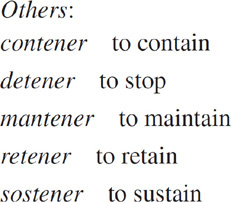
Traer to bring
Present Indicative: traigo, traes, trae, etc. I bring, etc.
Imperfect: traía, etc. I was bringing, etc.
Preterit: traje, trajiste, trajo, trajimos, trajisteis, trajeron I brought, etc.
Future: traeré, etc. I will bring, etc.
Conditional: traería, etc. I would bring, etc.
Present Participle: trayendo bringing
Past Participle: traído brought
Present Subjunctive: traiga, traigas, traiga, traigamos, traigáis, traigan that I bring/will bring, etc.
Imperfect Subjunctive: trajera (trajese), etc. that I brought/would bring, etc.; if I brought, etc.
Present Perfect Subjunctive: haya traído, etc. that I brought/have brought, etc.
Pluperfect Subjunctive: hubiera (hubiese) traído, etc. that I had brought/would have brought, etc.; if I had brought, etc.

Valer to be worth
Present Indicative: valgo, vales, vale, valemos, valéis, valen I am worth, etc.
Imperfect: valía, etc. I was worth, etc.
Preterit: valí, valiste, etc. I was worth
Future: valdré, valdrás, valdrá, valdremos, valdréis, valdrán I will be worth
Conditional: valdría, etc. I would be worth, etc.
Present Participle: valiendo being worth
Past Participle: valido valued
Present Subjunctive: valga, valgas, valga, valgamos, valgáis, valgan that I am worth/will be worth, etc.
Imperfect Subjunctive: valiera (valiese), etc. that I was worth/would be worth, etc.; if I were worth, etc.
Present Perfect Subjunctive: haya valido, etc. that I was worth/have been worth, etc.
Pluperfect Subjunctive: hubiera (hubiese) valido, etc. that I had been worth/would have been worth, etc.; if I had been worth, etc.
Venir to come
Present Indicative: vengo, vienes, viene, venimos, venís, vienen I come, etc.
Imperfect: venía, etc. I was coming, etc.
Preterit: vine, viniste, vino, vinimos, vinisteis, vinieron I came, etc.
Future: vendré, vendrás, vendrá, vendremos, vendréis, vendrán I will come, etc.
Conditional: vendría, etc. I would come, etc.
Present Participle: viniendo coming
Past Participle: venido come
Present Subjunctive: venga, vengas, venga, vengamos, vengáis, vengan that I come/will come, etc.
Imperfect Subjunctive: viniera (viniese) etc. that I came/would come, etc.; if I came, etc.
Present Perfect Subjunctive: haya venido, etc. that I came/have come, etc.
Pluperfect Subjunctive: hubiera (hubiese) venido, etc. that I had come/would have come, etc.; if I had come, etc.

Change the verbs to the tense and person indicated:
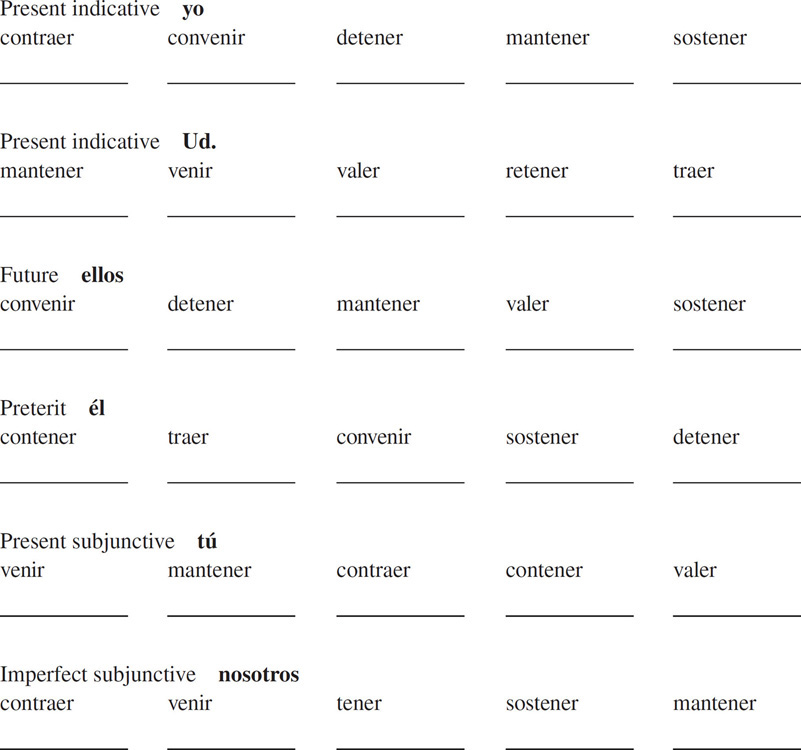
Write in English:
1. él habrá venido _________________________
2. que hayas traído _________________________
3. ellas tuvieron _________________________
4. que valgamos _________________________
5. ellos traerán _________________________
6. tuve _________________________
7. valdríamos _________________________
8. ellas habían venido _________________________
9. teníamos _________________________
10. traerías _________________________
11. has valido _________________________
12. vienes _________________________
13. valdrás _________________________
14. si él viniera _________________________
15. traje _________________________
16. tendré _________________________
17. si él valiera _________________________
18. que ellos tuvieran _________________________
19. él ha traído _________________________
20. que ellos vengan _________________________
21. ellos traían _________________________
22. Ud. tendría _________________________
23. valíamos _________________________
24. habremos venido _________________________
25. que traigas _________________________
26. Uds. tienen _________________________
27. yo valdría _________________________
28. si tuvieras _________________________
29. que trajéramos _________________________
30. venías _________________________
Write in Spanish:
1. she has not come _________________________
2. he had had _________________________
3. I hope you (s., fam.) bring _________________________
4. he was worth (pret) _________________________
5. it’s possible that we had _________________________
6. they had brought _________________________
7. you (pl., fam.) came _________________________
8. he used to bring _________________________
9. he had _________________________
10. they are worth _________________________
11. they would not have _________________________
12. she brought _________________________
13. they were coming _________________________
14. do you (s., fam.) have? _________________________
15. I hope they bring _________________________
16. it’s possible that he will come _________________________
17. we are not bringing _________________________
18. we will have _________________________
19. you (s., fam.) will be worth _________________________
20. do you (pl., fam.) have? _________________________
21. I hope you (s., fam.) don’t bring _________________________
22. I am coming _________________________
23. it’s possible that you (pl., for.) have _________________________
24. I am not worth _________________________
25. it’s impossible that you (s., fam.) have come
26. he would not bring _________________________
27. they had _________________________
28. they brought _________________________
29. will they come? _________________________
30. it was possible that you (pl., fam.) had _________________________
31. if he were worth _________________________
32. you (s., fam.) used to have _________________________
33. let us bring _________________________
34. he has had _________________________
35. you (s., fam.) have brought _________________________
36. didn’t they have? _________________________
37. it would not be worth _________________________
38. you (pl., fam.) are bringing _________________________
39. it was possible that we would come _________________________
40. it was possible that he would bring _________________________
ver to see
Present Indicative: veo, ves, ve, vemos, veis, ven I see, etc.
Imperfect: veía, veías, veía, veíamos, veíais, veían I was seeing, etc.
Preterit: vi, viste, vio, vimos, visteis, vieron I saw, etc.
Future: veré, etc. I will see, etc.
Conditional: vería, etc. I would see, etc.
Present Participle: viendo seeing
Past Participle: visto seen
Present Subjunctive: vea, veas, vea, veamos, veáis, vean that I see/will see, etc.
Imperfect Subjunctive: viera (viese), etc. that I saw/would see, etc.; if I saw, etc.
Present Perfect Subjunctive: haya visto, etc. that I saw/have seen, etc.
Pluperfect Subjunctive: hubiera (hubiese) visto that I had seen/would have seen, etc.; if I had seen, etc.